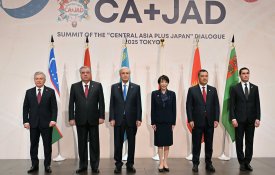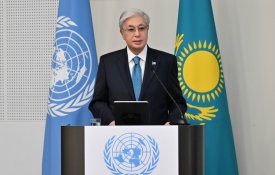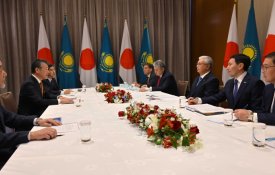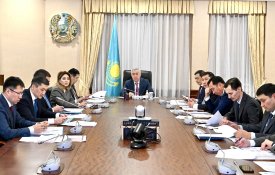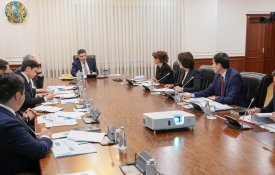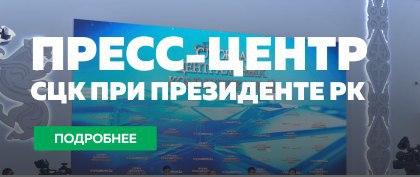Press release from the Central Communications Service affiliated with the President of Republic of Kazakhstan
Kazakhstan’s Human Rights Ombudsperson: State Must Investigate All Signals of Cruel Treatment, Give Them Legal Assessment, Publicize Results
Shymkent, 17 January 2022 – Peace and tranquility, order and lawfulness in the country depend not only on the legislative and executive authorities, but also on every citizen of Kazakhstan. This is a civic responsibility. What happened must become a lesson for all of us, said Elvira Azimova, Kazakhstan’s Human Rights Ombudsperson in Kazakhstan, at an online media briefing at the Central Communications Service.
“Human life is the highest value. This indisputable truth is the basis of the Constitution of the Republic of Kazakhstan. The tragic events that occurred in early January in our country shook Kazakhstan and the world community. Not only military servicemen and police officers, but also civilians became victims of terrorists. Our deepest condolences go out to the families and friends of the victims. To the injured, we wish a speedy recovery. The President of Kazakhstan made a clear statement regarding the citizens detained for participation in the riots: “Those who have committed serious crimes will be strictly punished in accordance with the law. The degree of guilt of others will be determined by the General Prosecutor’s Office and, if there are no aggravating circumstances, it must take measures to mitigate the punishment. We believe that the innocent will of course be released. We see that this is already happening,” the Ombudsperson said.
According to her, 91 people have been released and more than 70 administrative penalties have been commuted.
“We want this process to continue. There should be a clear separation between terrorists, between those who committed theft and looting, and those who participated in peaceful rallies. Unfortunately, when we visited detention facilities and talked with detainees, many said they were not fully aware of their civic responsibility and did not fully understand the consequences, but this, of course, does not exempt them from responsibility before the law and to society. At the same time, many said that they were ready to take responsibility and publicly express their regret. Many were detained for theft. I think that these points should be considered by the prosecutor’s office. These days we together with representatives of civil society continue to visit places where detainees are held. In a few days, we visited 34 such facilities in 11 regions. It is important for the prosecutor’s office to check all reports of brutality, give a legal assessment of them and make public the results. This work should not be conducted nominally. This approach is a guarantee of transparency and impartiality,” Ms. Azimova said.
The Ombudsperson said she received report of lawyers not being allowed to see their clients. According to her, there have been complaints of restricted access, failure to notify relatives of detainees’ whereabouts, failure to provide medical care in the first hours of detention or unwarranted detention, as well as 21 appeals about ill-treatment. Such facts are unacceptable. All applications and complaints are forwarded to the Prosecutor General’s Office and the Ministry of Internal Affairs for further investigation, Ms. Azimova emphasized.
“As a representative of Prosecutor’s Office said at the briefing yesterday, given the results of the inspection, the Prosecutor’s Office of Almaty reduced the administrative penalties for 71 citizens, 91 citizens were released. This is very important because we need the citizens’ trust in justice and lawfulness. We have addressed the Ministry of Internal Affairs, the Ministry of Health, the Prosecutor General’s Office with a request for full coverage in the mass media of all the measures taken. As we have seen in recent days, this request has been addressed. It is very important to ensure the rights of all citizens for access to information as much as possible, it is also necessary to continue informing foreign diplomatic missions immediately about the detention or in case of detention of foreign nationals to verify the facts or signals of illegal actions,” said the Ombudsperson.
During the days of unrest, due to problems with the communications systems, as shown by visits to special facilities in Almaty and Nur-Sultan, there were temporary difficulties with the identification of most of the detained citizens. Therefore, the relatives of many of them were late in receiving information about their detention. The same situation was in medical institutions, she said.
“Citizens were admitted to these facilities without documents, and there was a problem of providing first aid. They could not notify their relatives either... From the first days of the riots and until the introduction of the state of emergency, the police used only non-lethal weapons. This was repeatedly mentioned at the briefings of the Ministry of Internal Affairs and the Prosecutor General’s Office. At present, to respond promptly to citizens’ complaints related to detention during the riots, on the instructions of the Minister, monitoring groups have been set up in all territorial divisions of the Ministry of Internal Affairs and the central office, working continuously with the population. During the conversation with the Minister, he highlighted that the 102 service now accepts anonymous calls and one can send both video and other materials to this number. Each of us must help restore the rule of law. Your appeals and signals are your contribution to the prevention of violations and lawlessness in the future. At the same time, I would like to say that Respect for the law and the rights of other citizens is a guarantee of personal protection. We must avoid unfair accusations and we must unite and direct all our forces in a constructive direction. Let us remember, this is our country, this is our future,” summed up Ms. Azimova.
Visits to special institutions will be continuing. This is important to ensure independent monitoring of human rights and constitutional guarantees of access to protection, exclusion of ill-treatment and other guarantees of detention in closed institutions. National Preventive Mechanism (against torture) teams coordinated by the Human Rights Ombudsman accompanied Ms. Azimova in her visits to the detention centers in 11 regions, Director of the Sana Sezim Legal Center for Women’s Initiatives, a member of the Coordinating Council of the Human Rights Ombudsperson on the National Preventive Mechanism (NPM) Shakhnoza Khassanova added.
“Our mission is not just to collect appeals and complaints, but to constantly remind law enforcement agencies of public control, prevent further violations, and in case of receipt of appeals, immediately report them. The Prosecutor General and the Minister of Internal Affairs, taking into account the appeals of citizens and civil activists, were sent requests from the Human Rights Ombudsperson to resolve issues of admission of lawyers to clients, given that obtaining professional legal assistance is a constitutional right of citizens; holding trials with the obligatory participation of lawyers; periodic publication of up-to-date information for the population on detainees, released, convicted, administratively arrested, persons in medical institutions, deceased; unhindered visits by NPM participants to special facilities and premises of police and the National Security Committee bodies; posting contacts of operational headquarters, call-center on official Internet resources,” Ms. Khassanova added.
It is important to prevent groundless speculations and ensure an objective assessment of the situation and the actions of law enforcement during the recent riots. To do this, one needs to involve independent experts who have experience working during a state of emergency and mass unrest. It is possible to consider including international experts. This was stated by the Head of the Charter for Human Rights Public Foundation, a member of the National Council of Public Trust and of the Coordinating Council of the Human Rights Ombudsperson on NPM Zhemis Turmagambetova at the media briefing.
She believes that the General and lower prosecutor’s offices need not only to urgently consider the materials of all those detained for administrative offenses, but also to accelerate the consideration of the issue of alternative measures of punishment, rather than arrest, in respect of those guilty of administrative offenses.
“On January 13, together with the Human Rights Ombudsperson, we visited the detention facility SI-18 and the temporary detention facility in Almaty. Now our colleagues from NPM groups are visiting special facilities and detention centers in 11 other regions. Five more regions will be visited in the coming days. Over 34 institutions have already been visited by social workers. For example, in Almaty from among those brought to SI-18 from January 5 to the morning of January 13 there were 77 people. On the same day, 53 people were released from the pretrial detention center upon the prosecutor’s protest. Medical specialists, including specialists of Municipal Clinical Hospital #7, carried out examination and reception of specialists. 68 detainees were diagnosed, appropriate treatment was prescribed, and recommendations were made. Almost 90% of the detainees were detained under Article 188 part 3 of the Criminal Code of the Republic of Kazakhstan – theft and looting. It is very important to provide the population with access to information about the actions of law enforcement agencies and courts these days. It is necessary to increase efficiency and quality of communication of law enforcement and other state structures with the population. The Minister of Internal Affairs instructed the Department of Internal Security and local departments to be in constant contact and to respond immediately. I think that at central and regional levels we need to have a weekly 10-minute broadcast on TV and in social networks like “You’ve complained, we answer you.” It is necessary to inform the call centers, media, and in social networks about the results of the investigations in simple words, without clerical details. This will calm people down,” Ms. Turmagambetova emphasized.
She also highlighted the need to ensure as many hotlines for citizens on human rights issues as possible. In particular, legal assistance and advice, on documenting, collecting and processing information (video and audio, evidence of monitors, journalists and eyewitnesses); ensuring the right to life; ensuring the right to freedom from torture and ill-treatment; ensuring the right to qualified legal assistance of their choice and a confidential meeting with a lawyer before the first interrogation; ensuring the right to call, that is, to inform relatives about the whereabouts of the detained; ensuring the right to access information and journalists’ rights.
“All of the above needs to be done if one wants to consolidate public confidence in the institutions of state authority. Objective and impartial clarification of the causes of what happened, establishment of all the circumstances, analysis of the actions of authorities, law enforcement agencies, protesters, observance of fundamental rights during the investigation and trials will ensure the prevention of such tragedies in the future,” Ms. Turmagambetova summarized.



